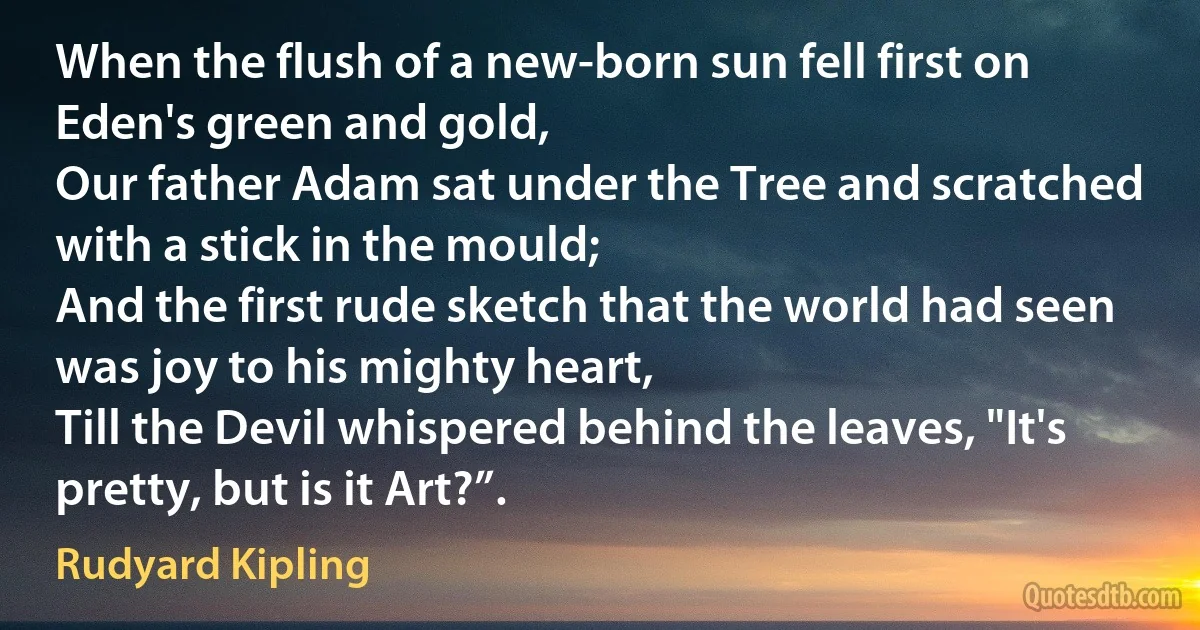Leaves Quotes - page 54
Into the New World my first message. You who gave the Ashram,
And you who gave two lives,
Proclaim.
Builders and warriors, strengthen the steps.
Reader, if you have not grasped - read again,
after a while.
The predestined is not accidental,
The leaves fall in their time.
And winter is but the harbinger of spring.
All is revealed; all is attainable.
I will cover you with My shield, if you but tend to your labors.
I have spoken.

Nicholas Roerich
Eddis nodded. "Gen leaves the reins in Attolia's hands. Which is not what either I or Attolia recommended, but wisely he ignored us both."
"Wisely?"
Smiling, Eddis said, "He hasn't the temperament. He gets angry. She only ever gets angry at him."
Sounis, having seen the Thief of Eddis lose his temper, could see her point.

Megan Whalen Turner
Tell me, is the cabbage you mention not as much a creature of God as you? Do you not both have God and potentiality for your father and mother? For all eternity has God not occupied His intellect with the cabbage's birth as well as yours? It also seems that He has necessarily provided more for the birth of the vegetable than for the thinking being... Will anyone say that we are born in the image of the Sovereign Being, while cabbages are not? Even if it were true, we have effaced that resemblance by soiling our soul in the way in which we resembled Him, because there is nothing more contrary to God than sin. If our soul, then, is no longer His image, we still do not resemble Him by our hands, feet, mouth, face and ears any more than the cabbage does by its leaves, flowers, stem, heart or head.

Cyrano de Bergerac
All hopes and despairs vanish in the voracious, funneling whirlwind of God. God laughs, wails, kills, sets us on fire, and then leaves us in the middle of the way, charred embers.
And I rejoice to feel between my temples, in the flicker of an eyelid, the beginning and the end of the world.
I condense into a lightning moment the seeding, sprouting, blossoming, fructifying, and the disappearance of every tree, animal, man, star, and god.
All Earth is a seed planted in the coils of my mind. Whatever struggles for numberless years to unfold and fructify in the dark womb of matter bursts in my head like a small and silent lightning flash.
Ah! let us gaze intently on this lightning flash, let us hold it for a moment, let us arrange it into human speech.
Let us transfix this momentary eternity which encloses everything, past and future, but without losing in the immobility of language any of its gigantic erotic whirling.

Nikos Kazantzakis
I see again the forest fires are starting. They're starting again in California. I said, you gotta clean your floors, you gotta clean your forests - there are many, many years of leaves and broken trees and they're like, like, so flammable, you touch them and it goes up. Maybe we're just going to have to make them pay for it because they don't listen to us.

Donald Trump
There is a legend about a bird that sings just once in its life, more sweetly than any other creature on the face of the earth. From the moment it leaves the nest it searches for a thorn tree and does not rest until it has found one. Then, singing among the savage branches, it impales itself upon the longest, sharpest spine. Dying, it rises above its own agony to out-carol the lark and the nightingale. One superlative song, existence the price. But the whole world stills to listen, and God in His heaven smiles. For the best is only bought at the cost of the great pain. ... Or so says the legend.

Colleen McCullough
Now everything changed. My childhood world was breaking apart around me. My parents eyed me with a certain embarrassment. My sisters had become strangers to me. A disenchantment falsified and blunted my usual feelings and joys: the garden lacked fragrance, the woods held no attraction for me, the world stood around me like a clearance sale of last year's secondhand goods, insipid, all its charm gone. Books were so much paper, music a grating noise. That is the way leaves fall around a tree in autumn, a tree unaware of the rain running down its sides, of the sun or the frost, and of life gradually retreating inward. The tree does not die. It waits.

Hermann Hesse
Isolated here in the North, planted long ago by a Roman pilgrim, a chestnut grew, strong and solitary, by the colonnade of rounded double arches at the entrance to the cloister of Mariabronn: a noble, vigorous tree, the sweep of its foliage drooping tenderly, facing the winds in bold and quiet assurance; so tardy in spring that when all glowed green around it and even the cloister nut trees wore their russet, it awaited the shortest nights to thrust forth, through little tufts of leaves, the dim exotic rays of its blossom, and in October, after wine and harvests had long been gathered, let drop the prickly fruits from its yellowing crown... The lovely tree, aloof and tender, shadowed the entrance to the cloister, a delicate, shuddering guest from a warmer clime, secretly akin to the slender double columns of the gateway, the pillars and mouldings of the window arches, loved by all Latins and Italians, gaped at, as a stranger, by the inhabitants. Ch. I.

Hermann Hesse
And I
in terror
but not in doubt of
what I must do
in anguish, in haste,
wrenched from the earth root after root,
the soil heaving and cracking, the moss tearing asunder -
and behind me the others: my brothers
forgotten since dawn. In the forest
they too had heard,
and were pulling their roots in pain
out of a thousand years' layers of dead leaves,
rolling the rocks away,
breaking themselves
out of
their depths.

Denise Levertov
I saw you standing with the wind and the rain in your face
And you were thinking 'bout the wisdom of the leaves and their grace
When the leaves come falling down
In September when the leaves, come falling down
Oh, the last time I saw Paris in the streets, in the rain
And as I walk along the boulevards with you, once again
And the leaves come falling down
In September, when the leaves come falling down.

Van Morrison
We stand up and the judge leaves, and Michael turns to me and says, "Bob, the jury system is much older than 200 years, isn't it?" I said, 'Well, yeah, it goes back to the Greeks." He says, "Oh yeah, Socrates had a jury trial, didn't he?" I said, "Yeah, well, you know how it turned out for him." Michael says, "Yeah, he had to drink the hemlock." That's just one little tidbit. We talked about psychology, Freud and Jung, Hawthorne, sociology, black history and sociology dealing with race issues. But he was very well read in the classics of psychology and history and literature.

Michael Jackson
The next day as they were leaving Bethany, Jesus was hungry. Seeing in the distance a fig tree in leaf, he went to find out if it had any fruit. When he reached it, he found nothing but leaves, because it was not the season for figs. Then he said to the tree, "May no one ever eat fruit from you again.” And his disciples heard him say it.

Jesus Christ
There is perhaps nothing more interesting than to listen to a superior man talk of what he does not know. He advances slowly, and scarcely puts his foot down without knowing if the ground is solid; he looks for plausible analogies; he tries to attach his ideas to higher and incontestable principles; he always has the tone of looking, never that of teaching; and it often happens that, even if he is mistaken, he leaves a great enough idea of his mental honesty.

Joseph de Maistre
We often find that we cannot easily give up the tendency to hold rigidly to patterns of thought built up over a long time. We are then caught up in what may be called absolute necessity. This kind of thought leaves no room at all intellectually for any other possibility, while emotionally and physically, it means we take a stance in our feelings, in our bodies, and indeed, in our whole culture, of holding back or resisting. This stance implies that under no circumstances whatsoever can we allow ourselves to give up certain things or change them.

David Bohm
I'm not disparaging suicides when I call them weak, I'm pointing out that anybody who would consider doing a thing like that needs help. I don't think a normal, mentally healthy person commits suicide. Of course, there are exceptions; people who are terminally ill are a different issue. But in the vast majority of cases, suicide is a tragedy that does unbelievable damage to the family and friends the suicide leaves behind. You don't want to encourage people to do such a thing.

Jesse Ventura
The man who works, the man who does great deeds, in the end dies as surely as the veriest idler who cumbers the earth's surface; but he leaves behind him the great fact that he has done his work well. So it is with nations. While the nation that has dared to be great, that has had the will and the power to change the destiny of the ages, in the end must die, yet no less surely the nation that has played the part of the weakling must also die; and whereas the nation that has done nothing leaves nothing behind it, the nation that has done a great work really continues, though in changed form, to live forevermore. The Roman has passed away exactly as all the nations of antiquity which did not expand when he expanded have passed away; but their very memory has vanished, while he himself is still a living force throughout the wide world in our entire civilization of today, and will so continue through countless generations, through untold ages.

Theodore Roosevelt
We do not "come into" this world; we come out of it, as leaves from a tree. As the ocean "waves," the universe "peoples." Every individual is an expression of the whole realm of nature, a unique action of the total universe. This fact is rarely, if ever, experienced by most individuals. Even those who know it to be true in theory do not sense or feel it, but continue to be aware of themselves as isolated "egos" inside bags of skin.

Alan Watts
You compare Cardozo with Spinoza; but as far as I can judge by your book there is no intellectual comparison. Spinoza was not soft. I have been all my life long a fervent disciple of Spinoza precisely on account of his firmness, of his uncompromising naturalism. Yet even he leaves out the three traditions which, however false their cosmology, seem to me morally sound: the Greek, the Catholic, and the Indian. I am therefore not a disciple of Spinoza in his ideal of human life: It leaves out poetry, art, traditional religion, military and constructive patriotism. His society would be a tame society, where there would be no masters, but all would be voluntary slaves. Perhaps you feel something of my difficulty when you point out that "art" is an indispensable ingredient in everything human.

Baruch Spinoza
Silence and coolness now the earth enfold:
Jewels of glittering green, long mists of gold,
Hazes of nebulous silver veil the height,
And shake in tremors through the shadowy night.
Heard through the stillness, as in whispered words,
The wandering God-guided wings of birds
Ruffle the dark. The little lives that lie
Deep hid in grass join in a long-drawn sigh
More softly still; and unheard through the blue
The falling of innumerable dew,
Lifts with grey fingers all the leaves that lay
Burned in the heat of the consuming day.

George William Russell
There can be no black-white unity until there is first some black unity. There can be no workers' solidarity until there is first some racial solidarity. We cannot think of uniting with others, until after we have first united among ourselves. We cannot think of being acceptable to others until we have first proven acceptable to ourselves. One can't unite bananas with scattered leaves.

Malcolm X



